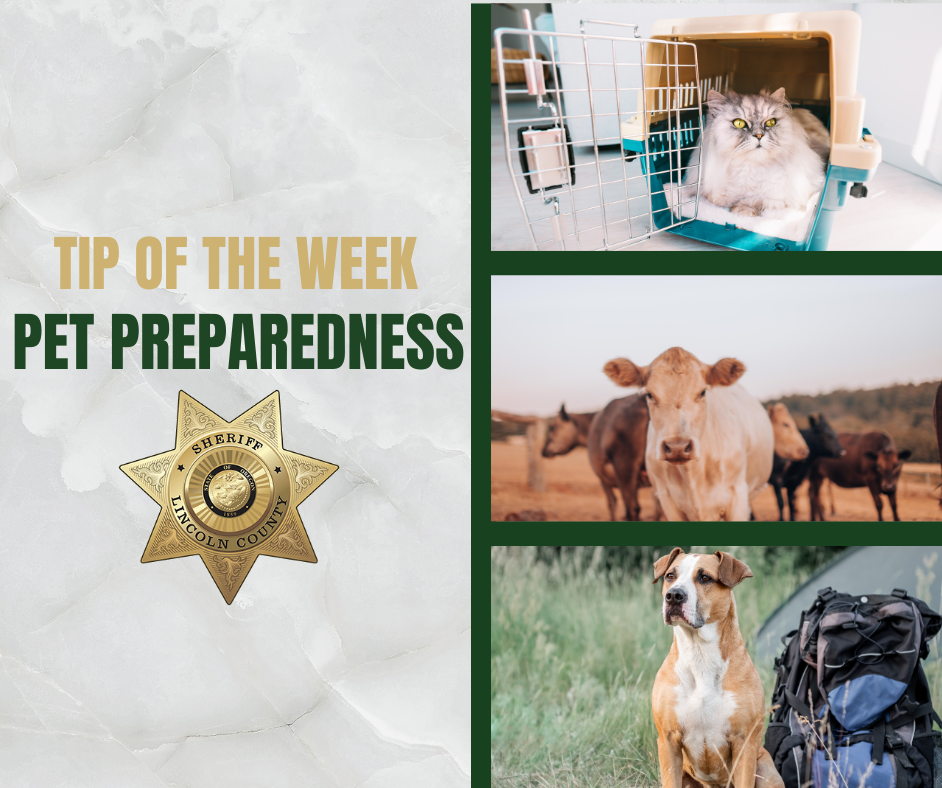Tip Of The Week For June 5, 2023 - National Pet Preparedness Month (Photo) - 06/05/23
NATIONAL PET PREPAREDNESS MONTH
June is National Pet Preparedness month and is the perfect time to review your emergency plans for your furry, scaley, and feathery family members. Keep your pets and livestock prepared for emergencies by taking these steps:
- Create and practice your emergency plan for pets and livestock.
- Take inventory of and replace expired emergency supplies such as pet food, medications, and water.
- Stay informed of local hazards and emergencies. Take appropriate steps to keep your animals safe and be prepared to evacuate them with your household.
Plan for Pets
- Take animals with you if you need to evacuate. Only as a last resort should animals be left behind.
- Create a plan with neighbors, friends, or relatives to evacuate your pet if you are not able to do so.
- Animals may run away or hide during an emergency. If your area is in a level one or higher evacuation warning, put your pet’s collar or harness on and keep them in a secure room. Doing this will allow you to grab them quickly if you need to evacuate.
- Many emergency shelters cannot accept animals. Before disaster strikes, find out which hotels/shelters allow animals or which friends outside of the area will be able to help.
- Be sure ID tags are on collars and consider a microchip.
- Keep your dog’s license (legally required) and cat’s license (recommended) updated. This helps animal get reunited with their families faster.
- Keep your pets’ vaccinations and ID tags up to date. Keep a copy of these documents in your family’s Go Bag.
- Prepare a pet emergency kit with leashes, collars, portable carriers, water, food, medications, sanitation materials, immunization records, first-aid kit, and photos to prove ownership.
- Don’t leave pets in vehicles, tethered, or crated without you.
- If you have to leave your animals at home, keep them inside a secure area. Leave at least a 10-day supply of dry food and water. Put signs on windows and doors indicating the number and type of animals inside and your contact information.
- Be aware that your pet’s behavior may change after a crisis. They may become more aggressive or self-protective.
Plan for Livestock
- If your area is in a level 2 or higher evacuation warning, evacuate with your livestock now. Begin preparing your livestock in a level 1 evacuation warning for transport. This will give you more time to safely secure your animals and get trailers or other equipment on the road before it is too late.
- Post emergency contact numbers on barns and/or pasture fences.
- Write your phone number on your stock with a permanent marker if you must release them.
- Have a supply of feed at a separate location.
- Involve family and neighbors in an evacuation plan.
- Make a kit with leads, halters, first aid, quieting hoods, water, photos, and a copy of your ownership papers.
More Resources for Pet and Livestock Emergency Planning can be found:
- Lincoln County Emergency Management Recorded Webinar: Animals: Pets and Livestock Preparedness - Wildfire Presentations 2021
- Ready.gov: Prepare Your Pets for Disasters
- Red Cross: Pet Disaster Preparedness
For more information and tips, visit our website at www.lincolncountysheriff.net and Like us on Facebook at Lincoln County Sheriff’s Office – Oregon
###

